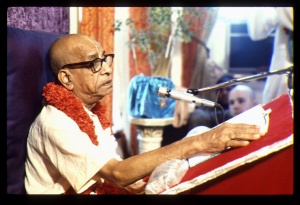CC Antya 1.138: Difference between revisions
m (1 revision(s)) |
(Vanibot #0054 edit - transform synonyms into clickable links, which search similar occurrences) |
||
| (One intermediate revision by one other user not shown) | |||
| Line 1: | Line 1: | ||
{{ | [[Category:Sri Caitanya-caritamrta - Antya-lila Chapter 01|C138]] | ||
<div style="float:left">'''[[Sri Caitanya-caritamrta|Śrī Caitanya-caritāmṛta]] - [[CC Antya|Antya-līlā]] - [[CC Antya 1|Chapter 1: Śrīla Rūpa Gosvāmī's Second Meeting With the Lord]]'''</div> | |||
<div style="float:right">[[File:Go-previous.png|link=CC Antya 1.137|Antya-līlā 1.137]] '''[[CC Antya 1.137|Antya-līlā 1.137]] - [[CC Antya 1.139|Antya-līlā 1.139]]''' [[File:Go-next.png|link=CC Antya 1.139|Antya-līlā 1.139]]</div> | |||
{{CompareVersions|CC|Antya 1.138|CC 1975|CC 1996}} | |||
{{RandomImage}} | |||
==== TEXT 138 ==== | ==== TEXT 138 ==== | ||
<div class="verse"> | |||
<div | :bhaktānām udagād anargala-dhiyāṁ vargo nisargojjvalaḥ | ||
bhaktānām udagād anargala-dhiyāṁ vargo nisargojjvalaḥ | :śīlaiḥ pallavitaḥ sa ballava-vadhū-bandhoḥ prabandho ‘py asau | ||
śīlaiḥ pallavitaḥ sa ballava-vadhū-bandhoḥ prabandho ‘py asau | :lebhe catvaratāṁ ca tāṇḍava-vidher vṛndāṭavī-garbha-bhūr | ||
lebhe catvaratāṁ ca tāṇḍava-vidher vṛndāṭavī-garbha-bhūr | :manye mad-vidha-puṇya-maṇḍala-parīpāko ‘yam unmīlati | ||
manye mad-vidha-puṇya-maṇḍala-parīpāko ‘yam unmīlati | |||
</div> | </div> | ||
| Line 15: | Line 18: | ||
==== SYNONYMS ==== | ==== SYNONYMS ==== | ||
<div class="synonyms"> | |||
<div | ''[//vanipedia.org/wiki/Special:VaniSearch?s=bhaktānām&tab=syno_o&ds=1 bhaktānām]'' — of devotees; ''[//vanipedia.org/wiki/Special:VaniSearch?s=udagāt&tab=syno_o&ds=1 udagāt]'' — has appeared; ''[//vanipedia.org/wiki/Special:VaniSearch?s=anargala&tab=syno_o&ds=1 anargala]-[//vanipedia.org/wiki/Special:VaniSearch?s=dhiyām&tab=syno_o&ds=1 dhiyām]'' — constantly thinking of Rādhā-Kṛṣṇa; ''[//vanipedia.org/wiki/Special:VaniSearch?s=vargaḥ&tab=syno_o&ds=1 vargaḥ]'' — the assembly; ''[//vanipedia.org/wiki/Special:VaniSearch?s=nisarga&tab=syno_o&ds=1 nisarga]-[//vanipedia.org/wiki/Special:VaniSearch?s=ujjvalaḥ&tab=syno_o&ds=1 ujjvalaḥ]'' — naturally very advanced; ''[//vanipedia.org/wiki/Special:VaniSearch?s=śīlaiḥ&tab=syno_o&ds=1 śīlaiḥ]'' — with natural poetic decorations; ''[//vanipedia.org/wiki/Special:VaniSearch?s=pallavitaḥ&tab=syno_o&ds=1 pallavitaḥ]'' — spread like the leaves of a tree; ''[//vanipedia.org/wiki/Special:VaniSearch?s=saḥ&tab=syno_o&ds=1 saḥ]'' — that; ''[//vanipedia.org/wiki/Special:VaniSearch?s=ballava&tab=syno_o&ds=1 ballava]-[//vanipedia.org/wiki/Special:VaniSearch?s=vadhū&tab=syno_o&ds=1 vadhū]-[//vanipedia.org/wiki/Special:VaniSearch?s=bandhoḥ&tab=syno_o&ds=1 bandhoḥ]'' — of the friend of the ''gopīs''', Śrī Kṛṣṇa; ''[//vanipedia.org/wiki/Special:VaniSearch?s=prabandhaḥ&tab=syno_o&ds=1 prabandhaḥ]'' — a literary composition; ''[//vanipedia.org/wiki/Special:VaniSearch?s=api&tab=syno_o&ds=1 api]'' — even; ''[//vanipedia.org/wiki/Special:VaniSearch?s=asau&tab=syno_o&ds=1 asau]'' — that; ''[//vanipedia.org/wiki/Special:VaniSearch?s=lebhe&tab=syno_o&ds=1 lebhe]'' — has achieved; ''[//vanipedia.org/wiki/Special:VaniSearch?s=catvaratām&tab=syno_o&ds=1 catvaratām]'' — the quality of a quadrangular place with level ground; ''[//vanipedia.org/wiki/Special:VaniSearch?s=ca&tab=syno_o&ds=1 ca]'' — and; ''[//vanipedia.org/wiki/Special:VaniSearch?s=tāṇḍava&tab=syno_o&ds=1 tāṇḍava]-[//vanipedia.org/wiki/Special:VaniSearch?s=vidheḥ&tab=syno_o&ds=1 vidheḥ]'' — for dancing; ''[//vanipedia.org/wiki/Special:VaniSearch?s=vṛndā&tab=syno_o&ds=1 vṛndā]-[//vanipedia.org/wiki/Special:VaniSearch?s=aṭavī&tab=syno_o&ds=1 aṭavī]'' — of the forest of Vṛndāvana; ''[//vanipedia.org/wiki/Special:VaniSearch?s=garbha&tab=syno_o&ds=1 garbha]-[//vanipedia.org/wiki/Special:VaniSearch?s=bhūḥ&tab=syno_o&ds=1 bhūḥ]'' — the inner grounds; ''[//vanipedia.org/wiki/Special:VaniSearch?s=manye&tab=syno_o&ds=1 manye]'' — I consider; ''[//vanipedia.org/wiki/Special:VaniSearch?s=mat&tab=syno_o&ds=1 mat]-[//vanipedia.org/wiki/Special:VaniSearch?s=vidha&tab=syno_o&ds=1 vidha]'' — of persons like me; ''[//vanipedia.org/wiki/Special:VaniSearch?s=puṇya&tab=syno_o&ds=1 puṇya]-[//vanipedia.org/wiki/Special:VaniSearch?s=maṇḍala&tab=syno_o&ds=1 maṇḍala]'' — of groups of pious activities; ''[//vanipedia.org/wiki/Special:VaniSearch?s=parīpākaḥ&tab=syno_o&ds=1 parīpākaḥ]'' — the full development; ''[//vanipedia.org/wiki/Special:VaniSearch?s=ayam&tab=syno_o&ds=1 ayam]'' — this; ''[//vanipedia.org/wiki/Special:VaniSearch?s=unmīlati&tab=syno_o&ds=1 unmīlati]'' — appears. | ||
</div> | </div> | ||
| Line 23: | Line 25: | ||
==== TRANSLATION ==== | ==== TRANSLATION ==== | ||
<div class="translation"> | |||
<div | " 'The devotees now present are constantly thinking of the Supreme Lord and are therefore highly advanced. This work named Vidagdha-mādhava depicts the characteristic pastimes of Lord Kṛṣṇa with decorations of poetic ornaments. And the inner grounds of the forest of Vṛndāvana provide a suitable platform for the dancing of Kṛṣṇa with the gopīs. Therefore I think that the pious activities of persons like us, who have tried to advance in devotional service, have now attained maturity.' | ||
</div> | </div> | ||
==== PURPORT ==== | ==== PURPORT ==== | ||
<div class="purport"> | |||
This is verse 8 of the First Act of the ''Vidagdha-mādhava''. | |||
</div> | |||
<div | <div style="float:right; clear:both;">[[File:Go-previous.png|link=CC Antya 1.137|Antya-līlā 1.137]] '''[[CC Antya 1.137|Antya-līlā 1.137]] - [[CC Antya 1.139|Antya-līlā 1.139]]''' [[File:Go-next.png|link=CC Antya 1.139|Antya-līlā 1.139]]</div> | ||
__NOTOC__ | |||
</div> | __NOEDITSECTION__ | ||
__NOTOC__ | |||
Latest revision as of 19:24, 19 February 2024

A.C. Bhaktivedanta Swami Prabhupada
TEXT 138
- bhaktānām udagād anargala-dhiyāṁ vargo nisargojjvalaḥ
- śīlaiḥ pallavitaḥ sa ballava-vadhū-bandhoḥ prabandho ‘py asau
- lebhe catvaratāṁ ca tāṇḍava-vidher vṛndāṭavī-garbha-bhūr
- manye mad-vidha-puṇya-maṇḍala-parīpāko ‘yam unmīlati
SYNONYMS
bhaktānām — of devotees; udagāt — has appeared; anargala-dhiyām — constantly thinking of Rādhā-Kṛṣṇa; vargaḥ — the assembly; nisarga-ujjvalaḥ — naturally very advanced; śīlaiḥ — with natural poetic decorations; pallavitaḥ — spread like the leaves of a tree; saḥ — that; ballava-vadhū-bandhoḥ — of the friend of the gopīs', Śrī Kṛṣṇa; prabandhaḥ — a literary composition; api — even; asau — that; lebhe — has achieved; catvaratām — the quality of a quadrangular place with level ground; ca — and; tāṇḍava-vidheḥ — for dancing; vṛndā-aṭavī — of the forest of Vṛndāvana; garbha-bhūḥ — the inner grounds; manye — I consider; mat-vidha — of persons like me; puṇya-maṇḍala — of groups of pious activities; parīpākaḥ — the full development; ayam — this; unmīlati — appears.
TRANSLATION
" 'The devotees now present are constantly thinking of the Supreme Lord and are therefore highly advanced. This work named Vidagdha-mādhava depicts the characteristic pastimes of Lord Kṛṣṇa with decorations of poetic ornaments. And the inner grounds of the forest of Vṛndāvana provide a suitable platform for the dancing of Kṛṣṇa with the gopīs. Therefore I think that the pious activities of persons like us, who have tried to advance in devotional service, have now attained maturity.'
PURPORT
This is verse 8 of the First Act of the Vidagdha-mādhava.